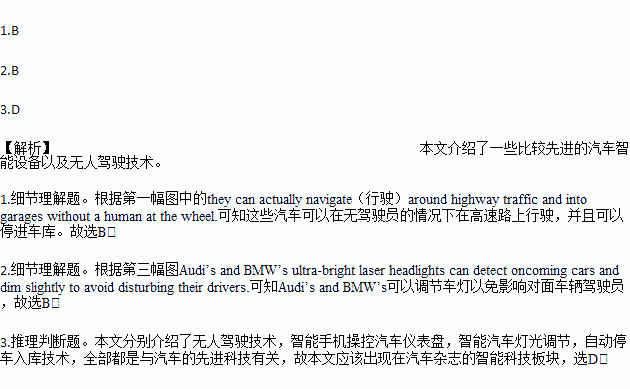题目内容
Self-driving Capabilities Sensor and camera-equipped models from Audi and Volkswagen, among others, don’t just automatically brake to prevent minor accidents; they can actually navigate(行驶)around highway traffic and into garages without a human at the wheel. |
Attractive Dashboards In addition to Ford’s new Sync system, which better understands voice commands, Apple and Google have partnered with automakers to create interfaces(界面)as user-friendly as the ones on your smartphone. |
Smarter Headlights Audi’s and BMW’s ultra-bright laser headlights can detect oncoming cars and dim slightly to avoid disturbing their drivers. One problem: they’re not yet legal in the U.S. |
Self-parking Skills The new model of BMW’s all-electric can find its own spot in a parking lot, then send signals via a smart-watch app to contact its drivers. |
1.In terms of Self-driving Capabilities, what makes Audi and Volkswagen stand out?
A. Braking when sensing red lights.
B. Going into garages without a driver.
C. Stopping other cars on highway.
D. Taking photos with a camera.
2.Which of the cars can adjust the headlights in order not to upset drivers in oncoming cars?
A. Ford and Volkswagen. B. Audi and BMW.
C. Audi and Volkswagen. D. BMW and Ford.
3.In which section of a car magazine does the article most probably appear?
A. First Drive. B. Cars For Rent.
C. Instrumental Tests. D. Smart Tech.
 名师金手指领衔课时系列答案
名师金手指领衔课时系列答案




